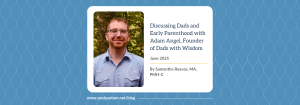Melissa’s Story
At PSI, we understand that storytelling has the power to save lives, and we are honored to provide a space for survivors to share their stories. This article is part of a subsection of the PSI blog dedicated to survivor stories. Please note that this story has not been edited, and caution is advised as distressing themes related to perinatal mental health may be present. If there are specific trigger warnings for an article, they will be listed below. Links to resources can be found at the bottom of this page.
The Journey to Adoption
Every adoption journey is unique, filled with love, hope, and sometimes, unexpected challenges. After adopting my oldest son, Jonathan, from South Korea, I was overjoyed to finally have him in my arms. But as time went on, I found myself struggling with something I never expected—depression. My hope in sharing this story is to bring awareness to post-adoption depression and let other parents know they are not alone.
I was married in September of 2000. My new husband and I went on a cruise for our honeymoon and decided to try for children right away. However, after years of trying, a traumatic miscarriage, exploratory surgery, and numerous cycles of Intrauterine Insemination (“IUI”), I was still not pregnant. I was devastated and felt hopeless. How could all my friends have children and not me? Is there some fundamental issue that my higher power deemed me not suitable to have a child? My husband and I were faced with a decision. Spend money on IVF with only a 50% chance of obtaining a pregnancy or adopting a child. We chose international adoption.
On a warm July day, we took our first steps on the path to adoption. That morning, my friend went into labor, and we cared for her toddler while she was at the hospital. In the afternoon, we had our first home visit, a moment I had been anxiously anticipating. I couldn’t shake the nervousness, knowing Korea had strict rules about mental health, and my past haunted me. After my miscarriage, I had fallen into such a deep depression that I needed to be hospitalized twice. The fear of my history standing in the way of our dream weighed heavily on me that day. The social worker stated that the inpatient admission wouldn’t play a role as it was “situational” and I did not have a history of depression. I didn’t understand the logic but I rolled with it.
Meeting Jonathan: Joy and Unexpected Challenges
In December 2004, we received a referral from our adoption agency for an adorable, fuzzy-headed baby boy. I was in love. It turns out that Jonathan was born two days after my friend’s son, Nicky, in July. I became obsessed with hearing about Nick’s growth and development as I knew it would correlate with my own child, who was still in Korea. In April 2005, I got “the call.” The one every adoptive parent waits for, telling them the baby is coming home.
When we adopted, Korea was still allowing escorts to bring the child to the US. We chose this option because it was cheaper and did not require both parents to spend five days in the country. On April 19, 2005, my parents, my husband, and I drove from upstate NY to Newark, NJ, to meet Jonathan’s airplane. My mom and I sat in the back seat with an empty car seat in between us and I cried the entire ride down. To this day, I can not pinpoint the emotion and the rationale behind why I was crying. I think there were so many emotions, including happiness and grief.
We arrived at the airport and the coordinator met us at the gate. Tears blurred my vision as I clutched the “welcome” balloon tighter and watched as the passengers disembarked from the plane. Then the flight crew came off and our little group, including three other families, clapped as we knew the babies came last. Then I saw him. I would imagine it was the same feeling you get when they place your new baby in your arms after delivery. Except my experience was in a crowded airport surrounded by complete strangers. After a while, we went back to the hotel and to our surprise, the hotel staff had all gathered in the lobby to welcome us with cheers and congratulations.
After the excitement faded, my parents went back to their room, and my husband fell asleep. I placed the baby in the pack-and-play, then crawled into bed, exhausted. But Jonathan, still 12 hours ahead in his time zone, was wide awake and full of energy—it was 11 a.m. for him. As I sat there in the dark, listening to my baby cry as I got up to comfort him, the thought crossed my mind: “What have I gotten myself into?” The reality hit me—I couldn’t just go to sleep whenever I wanted anymore. How could I even think that? And then the guilt rushed in. “How could I feel this way after everything I’d been through to get here?” I had longed for this baby, and here I was, angry that I couldn’t just turn off the lights and sleep?
A few weeks later, my parents and I went to the mall, and I was proudly pushing my baby in a stroller—something I had dreamed about for so long. It felt like a milestone, a moment of pure joy. But as we walked, I accidentally cut off a group of teenage boys, and after I apologized, one of them shouted, “Go back to your country, you Ch*nk.” My heart sank. I knew adopting a child from another country could be challenging, but I never expected this in the town I called home. I had been so naive to think racism didn’t exist here. The guilt washed over me. Had I made a terrible mistake? Had I taken my child from their birth country only to bring them into harm’s way because of my own selfish desire to be a parent? What if he grew up to hate me?
Around that same time, I decided to drop down a diaper size. Why? Because I longed for those moments of caring for a tiny baby, of experiencing the smallness I missed out on by adopting at nine months. But I quickly learned why diapers are sized the way they are, as I found myself cleaning out a messy car seat. At that moment, I felt cheated for not having a newborn, and the guilt became unbearable. My brain twisted this feeling, telling me I was a terrible mother for even thinking such things. What kind of mom feels this way? I was supposed to be grateful, not full of self-doubt.
Struggling with Depression
I spiraled into depression, feeling isolated and ashamed. I couldn’t bring myself to admit how I was feeling, even to myself. This was what I wanted, wasn’t it? How could I complain now? Good moms don’t have feelings like this. So, I buried everything deep inside, ignored my pain, and kept marching on with life, pretending I was fine when inside, I was anything but.
In March 2006, I found out I was pregnant with my younger son, Alex. It was a high-risk pregnancy because of an autoimmune disease that required me to take daily anticoagulant injections. By November, the time came for my planned cesarean section, and Alex was born. I thought I was prepared, having already been a mom to my two-year-old, but from the very beginning I struggled. I quickly realized I had no real experience caring for a newborn, and the feeling of being lost and overwhelmed hit me hard.
On top of recovering from a c-section, I was juggling the needs of a newborn, a toddler, and my father, who was recently diagnosed with dementia at only 61 and I began caring for him too. It was an impossible whirlwind, and I found myself drowning in exhaustion, unsure of how to handle it all.
Finding Support and Healing
My sister-in-law, who worked in mental health, helped set me up with a psychiatric nurse practitioner, but the appointment was six weeks away. In desperation, I turned to my OB for support. She brushed me off, telling me to contact my primary care physician. But my PCP was on vacation, so I had to see another doctor in the office. I was exhausted and desperate, begging her for something—anything—that could help me sleep, explaining that I just needed something to get me through until my specialist appointment.
The doctor looked at me coldly and said “No.” Her reason? I needed to stay alert for the baby. Then, as if my pain wasn’t already suffocating me, she launched into a lecture about my older son. She warned me not to forget about him, and that I shouldn’t let Jonathan grow up feeling unloved because I was focusing on the newborn. Was that true? Was I ignoring him? If I was not spending the same amount of time with him as I did, it would make me an atrocious mom.
In that moment, my heart shattered. I had never felt so low, so utterly defeated. Instead of receiving the help I was pleading for, I was made to feel like a failure as a mother. That was, without a doubt, the darkest point of my life.
Somehow, I made it to my NP appointment and was finally prescribed medication. During that time, I stumbled upon a chat board about postpartum depression and decided to join. It was there, among other mothers sharing their stories, that I came to a startling realization—I had been suffering from depression ever since I adopted Jonathan. There was a name for what I had been feeling all along. I wasn’t losing my mind, and I wasn’t being punished for being a bad mom. For the first time, I felt a sense of relief, knowing I wasn’t alone and that what I was going through was real and valid.
Reflections on Parenthood
It is estimated that 10 to 32% of parents have depression after an adoption. In contrast to postpartum depression (PPD), post-adoption depression is less frequently discussed or recognized, resulting in limited support and understanding from family, friends, and even healthcare providers. This lack of awareness can lead many adoptive parents to avoid seeking help, often due to the mistaken belief that they are expected to feel grateful or happy after adopting a child.
If you’re reading this and you’re struggling after adoption, I want you to know that you are not alone. It’s okay to not feel okay. Becoming a parent, whether through birth or adoption, is a huge adjustment, and it’s normal to feel overwhelmed at times. Embracing these challenges has brought me strength I didn’t know I had. So reach out, share your story, and know that healing is possible. Your love for your child and your mental health are not mutually exclusive—you can prioritize both.
Recently, my son became a father to a beautiful little girl and it has brought up mixed feelings. Sometimes, I feel like I’m getting a glimpse of what I missed when he was young, and it stirs up feelings I didn’t expect. I know that depression after adoption can leave behind a sense of loss or unfulfilled expectations, and seeing my granddaughter at this stage brings some of that to the surface.
But I also realize these feelings don’t take away from the love I have for my son or my granddaughter. It’s just part of my journey, and it’s okay to have those emotions. Maybe this is an opportunity for me to heal some of the pain I’ve carried.


References:
Foli, K. J. (2010). Depression in adoptive parents: A model of understanding through grounded theory. Western Journal of Nursing Research, 32(3), 379–400. https://doi.org/10.1177/0193945909351299
Get Help
Learn More about Perinatal Mental Health Disorders
Free Online Peer Support Groups, including Perinatal Mood Support









